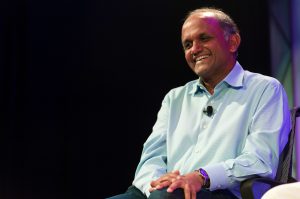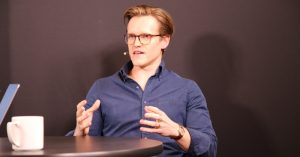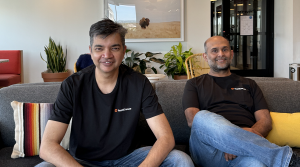After James Damore’s infamous memo criticizing Google Inc.’s diversity programs hit the public eye Aug. 5, the furor was palpable. Within days, Damore was fired, and his very public battle with the technology giant since then ignited a furious discussion of how and even whether the participation of women and other underrepresented groups in the tech industry should be encouraged.
That discussion no doubt will rage for years to come. But behind the bluster on both sides, a lot of folks have already been rolling up their sleeves and working on the problem instead of simply flapping their gums about it. In particular, a nonprofit called Iridescent has been working for years to bring science, technology, engineering and mathematics education to underserved girls around the world.
As it happened, the awards ceremony of Iridescent’s annual Technovation Challenge World Pitch Competition, in which teams of girls pitched apps they built to solve community problems, was scheduled at Google’s Mountain View, California headquarters on Aug. 11. That was the very day Google Chief Executive Sundar Pichai was forced to call off a planned all-hands meeting to discuss diversity in the wake of the Damore memo, because right-leaning groups threatened online harassment of employees. But Pichai did speak at Technovation, making an impassioned plea for women to come to Google and, by extension, other tech companies.
“I want you to know that there’s a place for you in this industry, there’s a place for you at Google,” he told the gathering of more than 900 girls, mentors and other supporters. “Don’t let anyone tell you otherwise. You belong here and we need you.”
It’s a message that Iridescent founder and Chief Executive Officer Tara Chklovski (pictured, left) has been pushing for eight years at Iridescent. She and Technovation Global Ambassador Anar Simpson (right), who works as a special adviser for women, girls and technology at Mozilla Corp., spoke this week with SiliconANGLE Media CEO John Furrier at the Palo Alto, California studio of SiliconANGLE’s video unit theCUBE.
The two women provided unusual insight into the issues involved in opening tech up to underserved communities — and those insights weren’t always what you might expect. Simpson, for instance, acknowledged that women may have to be patient about progress in tech, given that it took them a long time to become astronauts, neurosurgeons and lawyers — though Iridescent aims to shorten that time considerably.
Still, she said, the very existence of corporate “inclusion and diversity” departments indicates how far behind many companies are because they indicate the diversity ethic is not suffused throughout the organization by default. “You want to mainstream it,” she said. “I&D departments should have one goal, which is to work themselves out of a job.”
Surprisingly, Simpson also didn’t pile on some entrepreneurs such as Travis Kalanick, founder and former CEO of Uber Technologies Inc., which has been involved with numerous sexual harassment and bias incidents. “Shaking up the status quo is not easy,” she said. “You need somebody who’s a complete a-hole to do that.”
Entrepreneurship for girls
Technovation is the world’s largest technology entrepreneurship program for girls, according to Chklovski, one that was chronicled in “CodeGirl,” a documentary by Academy Award winner Lesley Chilcott. Among the kinds of girls the group serves is one group of 10-year-old girls from Cambodia at the pitch competition this year who created an app to help people working in cottage industries. “These girls would typically never go into careers in tech,” Chklovski said.
Interestingly, Technovation does not scout girls who have demonstrated interest or experience in tech. Instead, middle school to high school-aged girls are challenged to identify a problem in their communities. “And then we say, ‘Oh, by the way, you can solve this problem using technology,'” she explained.
Leading from community issues onward to coding attracts a group of girls who would not otherwise put a toe in tech, Chklovski explained. Once Technovation has captured these girls’ interest, instructors and mentors teach the girls how to code a mobile application. “The programming language that the girls use is block-based, so even though you don’t have a prior programming background, you can still build a working app,” Chklovski said.
Students also learn principles of entrepreneurship and how to form a startup from scratch. At the end of the 12-week, 100-hour program, teams submit a business pitch showing how their app solves the problem.
These girls may not have entered the program in love with tech, but they often come out that way, according to Simpson. “Our program works,” she said “Our in-touch reports show that these girls end up in tech-related fields as they progress.”
Technovation reached out to Simpson six years ago and asked her to mentor a team of California students. Knee-deep in her own startup endeavors at the time, Simpson initially balked. However, the program organizers asked only two hours per week, so she signed up.
Watching girls reluctantly enter the program and come out with brand new career aspirations inspired Simpson to become more involved. She began working with Chklovski to take Technovation global. Mainly through partnerships, Simpson has helped spread Technovation to more than 100 countries in just a few years. These partners include government agencies such as TechWomen from the U.S. State Department and UN Women.
The profit motive
Does Technovation offer more than a feel-good story about girls in third-world nations? Actually, yes, according to Simpson. For-profit businesses — not just philanthropic organizations — are on board for that reason, she said.
Kenya’s Safaricom Ltd., home of the country’s widely used mobile money transfer service M-PESA, has embraced Technovation, Simpson stated. “They know, for their business, having more women […] and a diverse company is making their product and their goods better,” she said. It’s worth noting that both Safaricom executives who have expressed interest in Technovation are male, she added.
The data on the technology skills-to-jobs ratio speaks for itself. According to the National Center for Women & Information Technology, by 2018 there will be twice as many technology jobs as there are people with skills to perform them. How will companies fill the gap? Currently, just 25 percent of computing jobs are held by women. Technovation believes that culling this underrepresented group for talent could lessen the skills shortage.
Reaching girls in their youth can help funnel more of them into tech careers, according to Chklovski. In fact, according to Technovation’s data, 26 percent of program participants who go onto college major in computer science. That is 65 times the U.S. rate of 0.4 percent female freshman CS majors, she pointed out. Technovation is now also working with Massachusetts Institute of Technology to increase the rigor of its curriculum.
A voice for the underrepresented
Technovation’s summit on the lawn of Google’s campus in Silicon Valley was timely, to say the least. But the Damore incident may mask Google’s longtime support of diversity efforts. For instance, since 2010, the company has provided funding, mentors and physical space to Technovation inside the U.S. and globally, according to Chklovski.
Damore’s memo may have divided people at Google and beyond, but Chklovski said she encourages the free exchange of ideas. The skills shortage and the role of women in tech are complex issues that ultimately affect both women and men. Therefore, she said, the voices of both are needed in these conversations.
“The discussion has to be very inclusive, and you cannot polarize,” Chklovski concluded.
For more from Chklovski and Simpson, check out the full videos:
Photo: SiliconANGLE
A message from John Furrier, co-founder of SiliconANGLE:
Your vote of support is important to us and it helps us keep the content FREE.
One click below supports our mission to provide free, deep, and relevant content.
Join our community on YouTube
Join the community that includes more than 15,000 #CubeAlumni experts, including Amazon.com CEO Andy Jassy, Dell Technologies founder and CEO Michael Dell, Intel CEO Pat Gelsinger, and many more luminaries and experts.
THANK YOU









